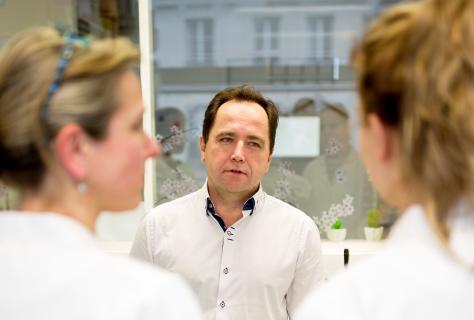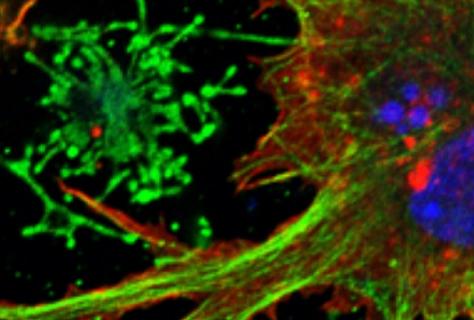Publish at
Presentation
Immunogenetics of pediatric autoimmune diseases
This project focuses on the mechanisms involved in the control of self-tolerance in primary human immunodeficiencies and in hyper immune syndromes. The autoimmune lymphoproliferative syndrome (ALPS) is associated with mutations of the Fas gene and apoptosis deficiencies. It is characterized by a benign tumoral syndrome along with autoimmune cytopenias.This condition thus represents a key model to study some aspects predisposing to autoimmune diseases in the context of apoptosis deficiency. Moreover, the genetic and clinical variability of the ALPS suggests that additional factors are involved in the onset of the disease.
The main goal of this work is to identify the modifiers involved in ALPS with Fas deficiency and to evaluate their possible contribution in similar or related conditions with yet undefined mechanisms. In addition of extrinsic and intrinsic apoptosis pathways study we analyze the development and the function of regulatory T cells in the context of ALPS. Such study is also performed in autoimmune disorders associated with deficiency of the regulatory T cells like in Immunodysregulation Polyendocrinopathy Enteropathy X-linked (IPEX) and in IPEX-like patients with autosomal inheritence, as well as in severe combined immunodeficiencies. This project is based on the availability of the patients’ blood samples, as well as on the development of animal or cellular models. This work should provide a better understanding of the molecular and cellular bases of the mechanisms involved in T cells homeostasis and self-tolerance, and should allow the identification of susceptibility factors to human auto-immune diseases.
Team
Resources & publications
-
 Journal (source)Blood
Journal (source)BloodDOCK11 deficiency in patients with X-linked actinopathy and autoimmunity
-
 2020Journal (source)Science
2020Journal (source)ScienceImpaired type I interferon activity and inflammatory responses in severe COVI...
-
 2020Journal (source)Nat Commun
2020Journal (source)Nat CommunEarly-onset autoimmunity associated with SOCS1 haploinsufficiency.
-
 2019Journal (source)Immunol. Rev.
2019Journal (source)Immunol. Rev.FAS and RAS related Apoptosis defects: From autoimmunity to leukemia.
-
 2019Journal (source)Blood
2019Journal (source)BloodPediatric Evans syndrome is associated with a high frequency of potentially d...
-
 2018Journal (source)Haematologica
2018Journal (source)HaematologicaEvolution of disease activity and biomarkers on and off rapamycin in 28 patie...
-
 2015Journal (source)J. Clin. Invest.
2015Journal (source)J. Clin. Invest.Inherited STING-activating mutation underlies a familial inflammatory syndrom...
-
 2011Journal (source)J. Clin. Invest.
2011Journal (source)J. Clin. Invest.Onset of autoimmune lymphoproliferative syndrome (ALPS) in humans as a conseq...
-
 2004Journal (source)N. Engl. J. Med.
2004Journal (source)N. Engl. J. Med.Autoimmune lymphoproliferative syndrome with somatic Fas mutations.
To read also
-

Research Acceleration
07/04/2023
Discovery of DOCK11 mutations responsible for a new X-linked autoimmune disease
-

Research Acceleration
21/10/2020
SOCS1: a newcomer in autoimmune diseases
-

Imagine Institute
01/10/2019
The 2018 annual report is online
-

Innovation
13/10/2020
Single cell analysis at the service of genetic diseases

Research: a scientific adventure
Our goal: to better understand genetic diseases to better treat them.



